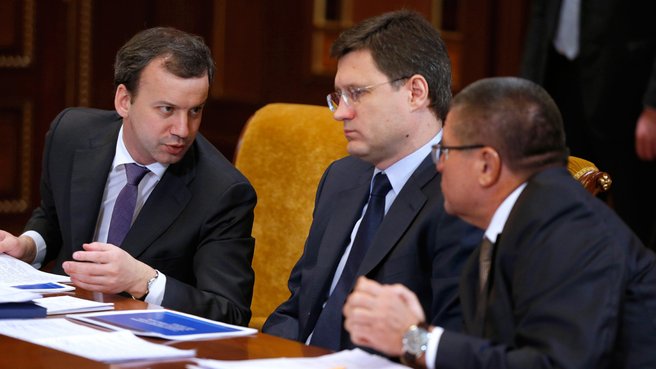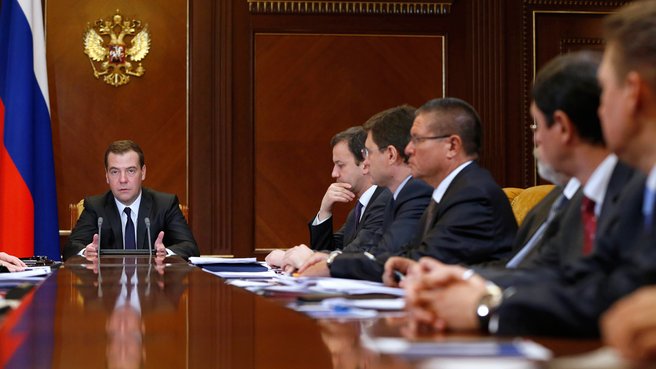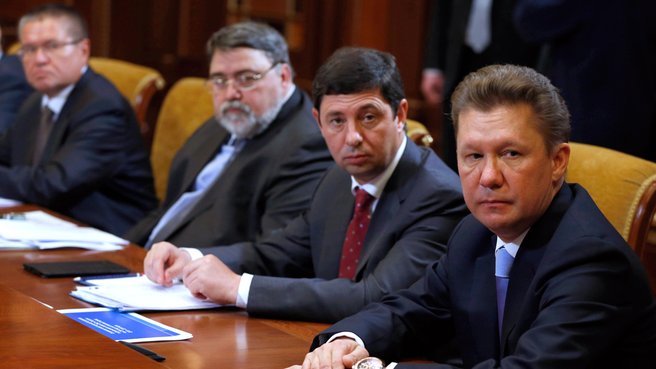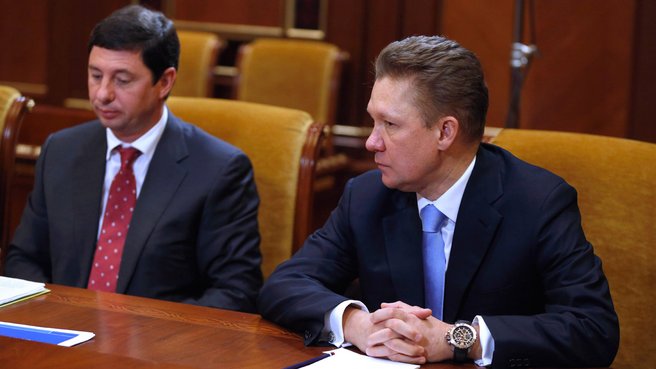Government meeting on Gazprom’s budget and investment programme for 2014-2016
Briefing by Gazprom CEO Alexei Miller
Opening remarks by Dmitry Medvedev:
Colleagues,
we are here today to discuss the investment programmes and financial plans of our major strategic companies, the first of which is Gazprom – for 2014 and the following two years.
This is part of our systemic effort to analyse the investment plans of large infrastructure-related companies, so that we can fully comprehend our strategy, think about the future development of the economy and fulfill the presidential and government instructions to cut costs and improve information disclosure.
The President recently said in his state-of-the-nation address that strategic companies’ investment programmes will now be subject to Government approval. We already discussed Russian Railways’ investment plans at a meeting in November, thus opening this series of Government meetings. Russian Grids will come next, followed by Transneft and several others.
Gazprom’s investment and financial results for this year and plans for the next will affect each and every Russian citizen, and this is no exaggeration.
Gazprom’s effective operation is crucial to having stable and reliable heat and power supplies, which is especially relevant in winter when Gazprom’s system and the entire energy sector struggle with the extra workload. Gazprom’s investment plans for 2014 exceed 800 billion roubles. In the coming years, the company’s investments are to grow consistently to reach almost 1 trillion roubles a year by 2016.
Next year’s investment may be somewhat lower compared to 2013, but the projects are to be carried out nonetheless. I am referring to drilling and tapping over 100 new gas wells, building nine compressor stations, laying over 1,500 kilometres of trunk pipelines, and expanding the underground storage facilities by 3 billion cubic metres next year. Gazprom is implementing a series of important long-term projects, not even national, but transcontinental projects such as the South Stream pipeline, the liquefaction plant in the Far East, and new gas production projects in various countries. This means that the structure of Gazprom’s expenditures is a very important issue, and this is not the first time we are discussing it. Gazprom is also working very diligently on its investment plans.
In any event, Gazprom will continue this work in cooperation with the Government Expert Council and our subordinate agencies, such as the Audit Chamber.
I’d like to emphasise that the goal of streamlining is not just the arithmetic reduction of expenses, as important as it is, especially now that the situation with prices and in some cases, with consumption is difficult. Streamlining should primarily be directed at improving quality indicators – I’m referring to energy efficiency and labour productivity, and this applies not only to Gazprom but also to other companies – and encouraging a company to use more modern technology for gas treatment, production and transportation. It is very important for a company to make its gas pipelines eco-friendly and reliable – something Gazprom has done at the top level over the years. We understand how unprecedentedly complicated this production is. No other company has such a network as Gazprom.
It is also important to reduce overheads and be more active in working with debtors. Not so long ago, I held a teleconference with regional governors at the request of Gazprom. I told them and other consumers how important it is to pay for gas on time, what figures they must reach, and what may happen to those who don’t pay. Gazprom has already taken many decisions on non-payers.
By the way, soon I will hold a meeting on energy consumption calculations in the regions that are part of the Southern Federal District and the North Caucasus Federal District. They are faced with major problems. We dealt with these issues last year, and we will certainly return to this subject this year as well.
Of course, Gazprom’s procurement system and its subsidiaries is not a system that is detached from the rest of our economy. It operates based on laws, including the law on the Federal Contract System which will enter into force in two weeks. If we want to do it right, we should prepare ourselves for this. I hope that Gazprom has already taken appropriate organisational decisions, because the number of suppliers is expanding to include small- and medium-sized businesses. Ultimately, procurement must become more efficient and more transparent for public scrutiny.
The financial parameters of the company (a series of decisions that are being acted upon) in numbers, costs and physical indicators will be reported by Gazprom CEO Alexei Miller. It would be beneficial to discuss forecasts for the future, so that we understand the main risks and ways to address them, all the more so since we have taken fairly complex decisions for Gazprom and other infrastructure monopolies. We also agreed that we will go beyond freezing tariffs by helping our companies, including Gazprom, because it’s a challenge for the companies that are associated with the investment programme.
<…>
Gazprom CEO Alexei Miller attends a news conference after a meeting to discuss the company’s investment programme and budget for 2014-2016
Transcript:
Question: Mr Miller, the discussion of your company’s investment programme just ended. Will the Board of Directors meet right now?
Alexei Miller: The board will meet today to discuss the investment programme.
Question: What about salaries?
Alexei Miller: [They will be calculated with due regard for] the deflator index, which the Ministry of Economic Development has calculated for Gazprom.
Question: Will the investment programme increase to more than 800 billion roubles taking into account the possible signing of a contract with China?
Alexei Miller: The investment decisions on the creation of production and transport systems to supply gas to China will be taken after we sign the 30-year gas supply contract with China.
Question: Do you think you will do this before the Chinese New Year [on January 31, 2014]?
Alexei Miller: This is what we expect.
Remark: No, in February.
Alexei Miller: The contract is almost ready to be signed. The only issue that has not been settled concerns the reference price.
Question: And how big is the difference? 10% or 15%?
Alexei Miller: We seem to have found points of contact.
Question: You are holding talks with your Ukrainian colleagues, who said last weekend that they are ready to resume discussions on a trilateral consortium. Have you received any proposals? Can this be used as the grounds for reducing the price?
Alexei Miller: You know, Gazprom and Naftogaz Ukraine stopped talks on a trilateral consortium long ago.
Question: Mr Miller, can you tell us about the exploration results for the South Kirinskoye gas and condensate field? What have you found there?
Alexei Miller: I believe we’ll publish the results of our exploration project in the Sea of Okhotsk soon. I’d like to say now that the Sea of Okhotsk is the priority exploration area for Gazprom, because of its proximity to our target markets, which are very big and are rapidly developing. And secondly, I can tell you that we expect to increase our reserves considerably.
Question: Gas reserves or...?
Alexei Miller: Both gas and oil reserves.
Question: Still, which of them will be bigger?
Alexei Miller: Let’s wait for the publication of the official figures. As for our exploration in the Sea of Okhotsk, we plan to expand this effort.
Question: Mr Miller, will Gazprom hold a Christmas party?
Alexei Miller: As you know, Gazprom has built several Olympic facilities in Sochi, including the Galaxy Centre, which will open on 20 December. We decided to meet there on the opening day to celebrate the completion of Gazprom’s Olympic programme and also the upcoming New Year.
Question: Will you comment, please, on what the President said about tax havens in his address to the Federal Assembly?
Alexei Miller: What do you want me to say? Just read the presidential address.
Question: Mr Miller, the Prime Minister said that despite a freeze on tariffs our companies will receive state assistance. What kind of assistance could Gazprom need? What did you discuss behind closed doors today?
Alexei Miller: I’d like to point out several issues. The first concerns the ownership of land and the use of land for the implementation of large infrastructure projects, for example, the construction of gas pipelines. Another issue deals with discussion deadlines and compensation payments. We have reached an agreement that Gazprom will work on practical issues jointly with federal authorities. We also agreed to cooperate with the Federal Anti-Monopoly Service (FAS) to further improve purchasing procedures. This concerns a very important issue – the prequalification of companies for the right to submit tenders. Gazprom has completed this work, but we have agreed to cooperate with the FAS in the framework of a working group on prequalification.
Question: Can you say a few words on the reduction of expenditures? You met with some pipe producers. Did you discuss cutting pipe prices with them for your large projects, for example the Power of Siberia gas pipeline project with China?
Alexei Miller: The issue of optimising spending on products and services concerns three elements: the pipes, the power and gas pumping equipment, and construction and assembly work. Regarding pipes, I can tell you that we have reached a very good compromise thanks to our cooperation with the FAS and the relevant federal ministries. First, I can tell you that Gazprom buys pipes at prices calculated with due account for the pipe producer’s internal rate of return. Second, the market is now absolutely transparent – there are no trading houses or any other intermediaries, and Gazprom buys pipes directly from the producers. I can assure you that this part of our purchases, which is very large, is also completely transparent and competitive and, most importantly, the prices are fair. The prices are clear and are considered fair by both the producers and the buyers. I wish that the other companies that buy pipes worked under the same principles.
As for the other two issues – the power and gas pumping equipment, and construction and assembly work – we discussed them at the meeting. Yes, some things need improvement. I’d like to point out the project which Gazprom has launched and will continue to implement. We did a monumental job when drafting the investment programme for 2014: during the meetings that began in September we analysed 34 expense items to substantiate spending under the investment programme. We also use new principles and approaches; in particular we have adopted standard norms and specific indicators for different expense items, and also collect information and use the best practices that exist in our industry and on the market. In other words, we don’t try to substantiate the expense cutting requests that we receive from a responsibility centre, but instead use standard norms and specific indicators to form our expense items. We will continue to work in this spirit. However, it should be remembered that some purchasing items concern very big projects, in particular, as regards power equipment and construction and assembly work.
Besides, working conditions differ from region to region. Gazprom has worked in the Yamal-Nenets Autonomous Area (in West Siberia) for 40 years, but now we are moving to East Siberia, where weather, natural, geological and other conditions are completely different. But we intend to plan our purchases, including in the field of construction and assembly, based on specific indicators and on the analysis of work in regions with similar conditions. We have started doing this and we will continue to do this, but it should be remembered that the supply of equipment for Gazprom cannot be standardised, unlike pipe purchases that can, even though there are many different types of pipes. We have adopted standard terms for pipe purchases, and we buy 98.5% of the pipes we need from Russian producers. Therefore, we have fulfilled the task that was formulated by the authorities several years ago to replace imported products with Russian-made ones.
<…>















